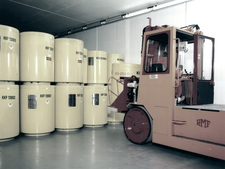Option for a central receiving storage facility for low- and intermediate-level radioactive wastes
BfS: Relief and thus benefit for the region
- Among other things, the Draft Act on the "Rearrangement of Responsibility of Nuclear Waste Management" regulates the transition of operator responsibility for radioactive waste interim storage facilities from the utilities to the federal government.
- Besides, the Draft Act contains an option for a central receiving storage facility for low- and intermediate-level radioactive wastes from nuclear power plants that are planned to be emplaced in the Konrad repository.
- Concerns have been voiced that, in addition to the repository planned so far, such a receiving storage facility might be erected at the mine site.
- As operator of the repository project, the BfS makes the following statement.

![]() Loading waste containers suitable for final storage
Loading waste containers suitable for final storage
Among other things, the Draft Act on the "Rearrangement of Responsibility of Nuclear Waste Management", which was passed by the Federal Cabinet on 19 October 2016, regulates the transition of operator responsibility for radioactive waste interim storage facilities from the utilities to the federal government. Besides, the Draft Act contains an option for a central receiving storage facility for low- and intermediate-level radioactive wastes from nuclear power plants that ares planned to be emplaced in the Konrad repository.
The licence under nuclear law for the Konrad repository provides for a "just-in-time" delivery of the waste. The plan is to erect just a small buffer storage facility for the waste packages.
Concerns have now been voiced in Salzgitter that, in addition to the repository planned so far, such a receiving storage facility might be erected at the mine site. As operator of the Konrad repository project, the BfS states:
- The delivery of the wastes to the repository will be carried out via rail and road, as is laid down in the plan-approval decision. Immediately following the receiving controls, the delivered waste packages are stored underground. It is neither planned nor necessary to change the processes laid down in the licence granted in 2002.
The BfS would welcome the installation of a central receiving storage facility because it would be a relief for the region for several reasons:
The provisions regarding emplacement in Konrad map a very complex system. The licence determines that the wastes must be stored strictly sorted by radioactive materials, chemicals and possible residual heat generation. As it is neither possible nor planned to place these waste containers in interim storage facilities at the surface in Salzgitter, one would have to plan the delivery day for each waste package well in advance.
Given that this would concern thousands of containers which had to be provided at different times, with different inventory at different locations in Germany, this system would be extremely susceptible to failure. A central receiving storage facility would contribute to design processes in such a way that
- the transports can be carried out as smoothly as possible,
- a tailback of waste containers in front of the facility could be avoided even better,
- he overall operating time of the repository could be shortened by avoiding downtimes and accelerating the emplacement process.
A site in the region or even at the mine does not require the aforementioned improvements through an optional receiving storage facility. In the event that such a receiving storage facility is to be constructed, the only thing that is absolutely important is the connection to an efficient infrastructure of rail and road.
- In the past, the BfS clearly opted against such a receiving storage facility on or near the mine site. There is no reason to change this position.
- A receiving storage facility would be built according to the state of the art of science and technology and improve safety, compared with the existing storage situation in the Federal Republic.
State of 2016.10.21

